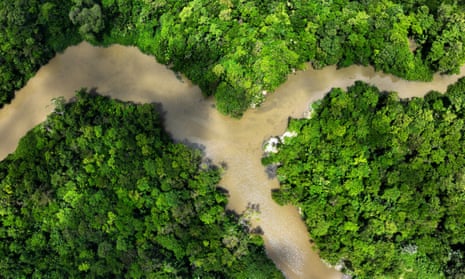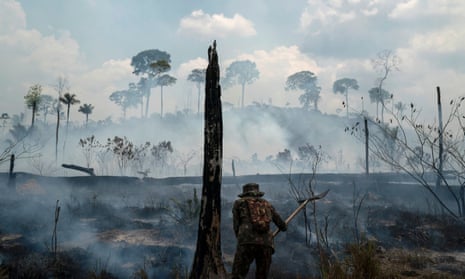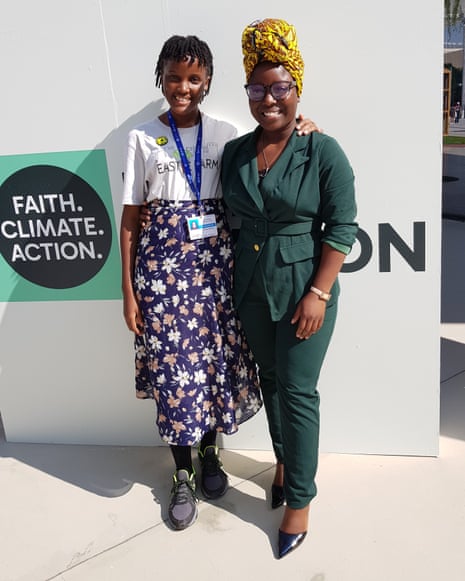‘Saudi Arabia and allies holding talks hostage’

Damian Carrington
“Saudi Arabia and allies are holding the talks hostage,” said Mary Robinson, chair of the Elders, on Sunday evening. “Nations obstructing a liveable future must abandon their subterfuge.”
The oil-rich kingdom has for three decades been the biggest single blocker at UN climate summits. Whether the rest of the world – especially the biggest players like China and the US – can apply sufficiently intense pressure in the final days of Cop28 will determine the summit’s success.
The pressure is also on Cop28 president, Sultan Al Jaber, who is also CEO of the UAE’s state oil company. His pitch was that being an oil baron meant he could bring others on board.
The Saudi line in the negotiations on Sunday was to complain: “We have raised our consistent concerns with attempts to attack energy sources instead of emissions.” In other words, fossil fuels are fine, it’s the CO2 emissions that are the problem, and they can be captured and stored.

Few buy that: “We have to phase out fossil fuels, period. We cannot CCS ourselves out of the problem,” said Wopke Hoekstra, the European commissioner for climate action.
Saudi tactics “include inserting words into draft agreements that are considered poison pills by other countries; slow-walking a provision meant to help vulnerable countries adapt to climate change; staging a walkout in a side meeting; and refusing to sit down with negotiators pressing for a phaseout of fossil fuels,” the New York Times reported on Sunday.
“Most countries vary on the degree or speed of how fast you get out of fossil fuels,” said Linda Kalcher, a former UN climate adviser who has been in negotiating rooms this week. Saudi Arabia, she told the newspaper, “doesn’t even want to have the conversation”.
The UN secretary general, António Guterres, didn’t name Saudi Arabia today as he rallied nations to deliver a strong deal, but reading between the lines was not hard. “Ministers and negotiators must move beyond arbitrary red lines, entrenched positions and blocking tactics. It is essential [to] recognise the need to phase out all fossil fuels.”
UN climate chief Simon Stiell had similar thoughts this morning: “Clear the unnecessary tactical blockades out of the way – there have been many along this journey.” Earlier in the week, the Saudi energy minister refused to even contemplate a weaker call to “phase down” fossil fuels. “Absolutely not,” he said.
A report by the Climate Social Science Network, published just ahead of Cop28, set out the long history of Saudi obstruction. “The fossil fuel giant has a 30-year record of obstruction and delay, protecting its national oil and gas sector and seeking to ensure UN climate talks achieve as little as possible, as slowly as possible,” it said.
“It is not difficult to understand Saudi Arabia’s motivation – half its GDP and 70% of export income comes from oil and gas,” the report said. “Despite increased temperatures across Saudi Arabia and falling groundwater supplies, Riyadh has shown little sign of shifting strategy.”
The report also noted: “Riyadh is largely responsible for the absence of any agreed voting rule [at Cop meetings]. In the early 1990s, when the decision-making rules were being devised, Saudi Arabia, together with Opec allies, refused to accept any majority voting rule, as would be the norm in UN bodies.” That means all countries effectively have a veto, unless faced down.
The position of the oil cartel Opec was revealed at Cop28 in leaked letters reported by the Guardian. Opec’s head urged member countries to “reject any text that targets energy, i.e. fossil fuels rather than emissions”, saying “it would be unacceptable that politically motivated campaigns put our people’s prosperity and future at risk”.
Many commentators said the biggest threat to the world’s prosperity and future is the climate crisis and Spanish minister Teresa Ribera, who represents EU governments in the negotiations, called Opec’s lobbying “disgusting”.
Saudi Arabia dominates Opec but another key member, Iraq, refused to accept references to a phase down or phase out of fossil fuels in the negotiations on Sunday. Opec’s head of PR told a campaigner that wildfires and other climate impacts have “nothing to do with oil”.
Australia’s climate change minister Chris Bowen was diplomatic when asked about Saudi Arabia and its allies by my colleague Adam Morton today, saying they had “a very different view” on the push for a phase out of fossil fuels, or even unabated fossil fuels.
“I had a meeting, a long meeting, with the Saudi minister on Sunday where we compared notes – not every country is yet on the same page” he said.
Veteran Cop-watcher Ed King said: “History tells us that when isolated, Riyadh typically buckles.”
Key events

Patrick Greenfield
New text even more imminent than it was three hours ago.
The wait may soon be over here in Dubai. The UAE presidency has told countries to expect a text at 6pm local time and a 8pm plenary with heads of delegations. The text release time has moved all day so this could obviously change again.
This is the wording of the message, which may be quite optimistic about the scheduled finish time tomorrow.
“Dear friends, many thanks for your patience as we work on presidency texts. And for all your inputs and consultations! We look forward to sending the GST draft shortly, and subsequent decision texts by this evening. A “first closing plenary” will be held at 6pm, per usual practice, to close out agreed decisions including to nominate Azerbaijan and Brazil as hosts of COP29 and COP30 respectively. We will convene an informal consultation with ministers and other HODs at 8pm.
Thank you for your continued partnership towards a successful outcome- we look forward to closing this out together and hopefully on time tomorrow.”
$94m boost for Amazon Fund from Norway and UK
Norway and the UK have promised $94m for the Amazon Fund, which is the biggest source of overseas financial support for the world’s biggest tropical rainforest and its inhabitants.
At an event in Cop28, Norway pledged $50m and the UK $44m. Both nations said this was new money in addition to previous commitments to the Fund, which is used for monitoring deforestation, combating illegal extractive activities and managing more than a million square kilometres of indigenous territories and other protected areas.

Rainforests are essential for the world’s climate. Without their capacity to draw down carbon dioxide from the atmosphere, there is no possibility of keeping global heating with the 1.5C to 2C target of the Paris Agreement. However, more than 17 % of the forest is already deforested and another 17% degraded, according to the Science Panel for the Amazon.
Human-caused climate disruption is making matters worse by prolonging the dry season. This year was particularly bad with many rivers at record lows and extensive fires. Climate scientists warn that the rainforest is close to a tipping point, after which it will dry up.
The rate of deforestation in Brazil, which is home to 60% of the Amazon, has slowed by about half thanks to conservation policies by Brazilian President Luis Inácio Lula da Silva and his environment minister Lula Silva. They are aiming for zero deforestation by 2030 and have proposed a separate new fund to achieve this goal at Cop28.

The Rainforest Foundation Norway welcomed the new money for the Amazon Fund from the UK and Norway, but stressed that more is needed.
“Brazil needs international support to fulfil its ambition of zero deforestation in the Amazon. This vital rainforest is of global importance for climate and biodiversity, and protecting it is a responsibility that cannot lie with Brazil alone. We can only keep the 1.5 degree target alive if more countries contribute to rainforest protection, as through the Amazon Fund,” said the groups’s executive director Toerris Jaeger,
He said the fund has largely been supported by Norway (94%), Germany (6%) and has recently been promised support also from Switzerland, UK, Denmark and the US, but hardly any of the newly promised support has been disbursed.
Bad news for the climate. India says it will likely nearly double coal production by 2030, reports Akshat Rathi for Bloomberg Green.
While nearly 200 countries negotiate text to phase out fossil fuels, India’s coal ministry announces its plan to nearly double its coal production to 1.5 billion tons annually by 2030.
Also: “100% Foreign Direct Investment has also been allowed.” https://t.co/rVMe9p4sIU
— Akshat Rathi (@AkshatRathi) December 11, 2023
Ketan Joshi, a veteran climate campaigner, has written a withering thread on X about the United States’s role in negotiations on carbon trading. Here are some extracts:
The US and other countries are pushing to kill efforts to make carbon trading transparent and less prone to fraud and fakery. Let me explain why this is VERY BAD
The US is fighting for the continuation and expansion of all the flaws of carbon markets
“If the negotiations end like this, the carbon colonialists will come knocking, and being able to do anything about it will become incredibly difficult” Countries like US know that weak rules = cheaper offsets, even if that means more fraud / dodginess
There are two sides in this war: those who want to sell as many carbon offsets as possible, and those who want to reduce planet-heating emissions as much as possible. There’s some overlap, but fundamentally, the two priorities drive two clearly different approaches to rule-making.
We heard similar criticism from others yesterday, as my colleague Patrick Greenfield reported on this blog.
To read Ketan’s thread in full, click below:
Okay, listen up: this is about the big #COP28 problem you probably haven’t heard about.
The US and other countries are pushing to kill efforts to make carbon trading transparent and less prone to fraud and fakery. Let me explain why this is VERY BAD 🧵
— I’m @Ketanjoshi.co on Bluesky (@KetanJ0) December 11, 2023
Many faith-based groups are hopeful that the new Cop28 text will help the poorest members of society, who are the worst affected and least to blame for the climate crisis.
Jessica Bwali, a Christian global campaigner for Tearfund, says:
“The final negotiations hang in the balance. As a Christian climate campaigner, I am praying for world leaders to show brave servant-heartedness, long-term thinking and a commitment to put the good of the poorest first.
“In these late stages of the UN climate talks, it’s essential to hold firm on the progress made last week and secure agreement to phase out all fossil fuels. It’s vital that this phase-out is fair and funded. We need to avoid any distractions from the urgent, life-saving work of genuinely reducing emissions.”

More Cop28 participants are sending in comments about their hopes for the new text.
Alexis McGivern, net zero standards manager at the Smith School, University of Oxford:
“We’re hopefully going to see the key cause of the climate crisis – fossil fuels – directly addressed head on in the text. Of course, without the requisite finance and technology transfer to the global south to help their transition, and without historical polluters stopping extraction first, this will not be equitable. Centring a just approach to transition means understanding that any cover text must echo Paris language of common but differentiated responsibilities.
“The mood from civil society is hopeful from but vigilant: we have an immense opportunity, underlined by UNSG [António] Guterres, to build in a fossil fuel phase-out into the text. Folks are tired: it’s been a long few weeks and a few of the “informal informals” were scheduled for 6am this morning.

Patrick Greenfield
The Beyond Oil & Gas Alliance (BOGA), led by the Danish climate minister, Dan Jørgensen, is giving an update on proceedings as the world continues to wait for a text from the Cop28 presidency.
“The stone age didn’t end because the world ran out of stone. Likewise, the fossil era won’t end because we don’t have oil, gas and coal left. It will only end if we make a conscious political decision. The good news is we have the alternatives. Hopefully at this Cop, we will also be able to make the political decision to make this real so we can stay below 1.5C.”
An alliance of countries, who say they are leaders on the phase-out of fossil fuels, are speaking in turn in Dubai. The French minister for the energy transition, Agnès Pannier-Runacher, is calling for language on the fossil fuel phase-out in the text.
“The momentum has come to act and agree on an ambitious and clear language on fossil fuels … Cop28 should be the Cop where countries agree on ambitious language on phasing out fossil fuels to keep 1.5C alive,” she says.
Susana Muhamad, Colombia’s environment minister, said:
“This is not a transition that will happen from one day to the other. Whole economies and societies are depending on fossil fuels and capital. This will require a just phase-out and an orderly transition … We could choose the path to keeping 1.5C alive and an orderly economic transition. For this, we are calling as BOGA that this needs strong financial reforms. It will not happen on its own. We need to align the economic and financial systems to the reality of the financial crisis.”
On the question on everyone’s lips at Cop28 …
“Why hasn’t the text arrived? Because it’s difficult. The presidency is working really hard. We should give them the time that they need,” says Jørgensen.
More on what people are hoping to see in the new text, which is due to be released imminently by the Cop28 presidency.
Sven Harmeling, global policy lead for the CARE Climate Justice Centre, said:
“The decisions made at COP28 must support communities who are facing the worst impacts of climate change but have done the least to cause it.
“Firstly, we must see progress on fossil fuel phase out in line with the science on 1.5 degrees. This is critical to prevent global warming escalating beyond control.
“Secondly, negotiations on adaptation and climate finance have been extremely difficult. Developing countries cannot be left to meet the costs of climate change without support. Far too often, wealthy countries have failed to keep their promises. The final outcome must include binding agreements to ensure they are implemented on time and in full.
“We remain hopeful that an ambitious agreement can be reached to save lives and livelihoods.”
Nina Lakhani
At Cop, the focus is mostly on the planetary consequence of not phasing out oil, gas and coal. But often missed in the debate over unabated vs abated fossil fuels, are the real-life direct impacts of fossil fuel extraction and production on life-and-death matters such as air pollution, water scarcity, criminalization, and land grabs, which would continue apace regardless of the miracles promised by carbon capture technologies.
Amnesty International has just published a report into the “criminalization, surveillance, intimidation, harassment, degrading treatment and dispossession of Wet’suwet’en nation land defenders’’ which documents the years-long crackdown against those resisting the construction of Coastal GasLink (CGL) liquified natural gas pipeline through their unceded ancestral territory without their free, prior and informed consent. Amnesty found that Wet’suwet’en land defenders and their supporters were arbitrarily arrested for defending their land and exercising their Indigenous rights and their right to freedom of peaceful assembly – and that the police raids were disproportionate. In addition, Amnesty documented a pattern of aggressive surveillance and harassment against Wet’suwet’en defenders, including discriminatory, degrading and highly culturally insensitive conduct.
The Guardian has been reporting on the criminalization of land, environment and climate activists around the world.
Read more here:
‘Saudi Arabia and allies holding talks hostage’

Damian Carrington
“Saudi Arabia and allies are holding the talks hostage,” said Mary Robinson, chair of the Elders, on Sunday evening. “Nations obstructing a liveable future must abandon their subterfuge.”
The oil-rich kingdom has for three decades been the biggest single blocker at UN climate summits. Whether the rest of the world – especially the biggest players like China and the US – can apply sufficiently intense pressure in the final days of Cop28 will determine the summit’s success.
The pressure is also on Cop28 president, Sultan Al Jaber, who is also CEO of the UAE’s state oil company. His pitch was that being an oil baron meant he could bring others on board.
The Saudi line in the negotiations on Sunday was to complain: “We have raised our consistent concerns with attempts to attack energy sources instead of emissions.” In other words, fossil fuels are fine, it’s the CO2 emissions that are the problem, and they can be captured and stored.

Few buy that: “We have to phase out fossil fuels, period. We cannot CCS ourselves out of the problem,” said Wopke Hoekstra, the European commissioner for climate action.
Saudi tactics “include inserting words into draft agreements that are considered poison pills by other countries; slow-walking a provision meant to help vulnerable countries adapt to climate change; staging a walkout in a side meeting; and refusing to sit down with negotiators pressing for a phaseout of fossil fuels,” the New York Times reported on Sunday.
“Most countries vary on the degree or speed of how fast you get out of fossil fuels,” said Linda Kalcher, a former UN climate adviser who has been in negotiating rooms this week. Saudi Arabia, she told the newspaper, “doesn’t even want to have the conversation”.
The UN secretary general, António Guterres, didn’t name Saudi Arabia today as he rallied nations to deliver a strong deal, but reading between the lines was not hard. “Ministers and negotiators must move beyond arbitrary red lines, entrenched positions and blocking tactics. It is essential [to] recognise the need to phase out all fossil fuels.”
UN climate chief Simon Stiell had similar thoughts this morning: “Clear the unnecessary tactical blockades out of the way – there have been many along this journey.” Earlier in the week, the Saudi energy minister refused to even contemplate a weaker call to “phase down” fossil fuels. “Absolutely not,” he said.
A report by the Climate Social Science Network, published just ahead of Cop28, set out the long history of Saudi obstruction. “The fossil fuel giant has a 30-year record of obstruction and delay, protecting its national oil and gas sector and seeking to ensure UN climate talks achieve as little as possible, as slowly as possible,” it said.
“It is not difficult to understand Saudi Arabia’s motivation – half its GDP and 70% of export income comes from oil and gas,” the report said. “Despite increased temperatures across Saudi Arabia and falling groundwater supplies, Riyadh has shown little sign of shifting strategy.”
The report also noted: “Riyadh is largely responsible for the absence of any agreed voting rule [at Cop meetings]. In the early 1990s, when the decision-making rules were being devised, Saudi Arabia, together with Opec allies, refused to accept any majority voting rule, as would be the norm in UN bodies.” That means all countries effectively have a veto, unless faced down.
The position of the oil cartel Opec was revealed at Cop28 in leaked letters reported by the Guardian. Opec’s head urged member countries to “reject any text that targets energy, i.e. fossil fuels rather than emissions”, saying “it would be unacceptable that politically motivated campaigns put our people’s prosperity and future at risk”.
Many commentators said the biggest threat to the world’s prosperity and future is the climate crisis and Spanish minister Teresa Ribera, who represents EU governments in the negotiations, called Opec’s lobbying “disgusting”.
Saudi Arabia dominates Opec but another key member, Iraq, refused to accept references to a phase down or phase out of fossil fuels in the negotiations on Sunday. Opec’s head of PR told a campaigner that wildfires and other climate impacts have “nothing to do with oil”.
Australia’s climate change minister Chris Bowen was diplomatic when asked about Saudi Arabia and its allies by my colleague Adam Morton today, saying they had “a very different view” on the push for a phase out of fossil fuels, or even unabated fossil fuels.
“I had a meeting, a long meeting, with the Saudi minister on Sunday where we compared notes – not every country is yet on the same page” he said.
Veteran Cop-watcher Ed King said: “History tells us that when isolated, Riyadh typically buckles.”
Hello. This is Jon Watts, taking over the Cop28 liveblog. Thanks to my colleague Ajit Naranjan for staying on top of things until now.
Cop28 has been in a holding pattern for most of the day while everyone waits for a new text to land. It is expected imminently, but they have been saying that for some time.
Attention will focus on what it says about fossil fuels – a phase-out, a phase-down, something else or nothing at all? Everyone knows this is the litmus test for this Cop. Will the reaction be euphoria, dispondancy or confusion? We shall soon find out.
I imagine things will get frantic as soon as we know. The Guardian team in Dubai will keep us updated so let’s settle in for what is potentially a very important day in the history of climate negotiations. Please send suggestions, comments or questions to me at [email protected] or via X (formerly Twitter) @jonathanwatts
Nina Lakhani
As we wait for the final draft to drop, it’s worth refreshing our tired brains about why the word “unabated” is key to the fight over a fossil fuel phase out – which by and large the major pollution nations like the US, UK, Canada and others are pushing for.
The “unabated” burning of oil, gas and coal results in CO2 or other greenhouse gases being released directly into the atmosphere. The problem is that there is no agreement on what “abated” means. In general, it refers to burning fossil fuels combined with unproven niche technologies like capture and permanent storage of an undefined proportion of the greenhouse gases emitted. This would, warn scientists, give the fossil fuel industry and big polluting countries a get-out clause, when the only real solution is to stop extracting and burning all fossil fuels.

Developing countries with oil, gas and coal resources have warned that the phase out/down of “unabated” fossil fuels will allow wealthy countries to buy CCS technologies and keep extracting, while they would be penalised – which would be unfair and discriminatory.
Nafkote Dabi, Oxfam International’s climate change policy lead, said: “Abatement linked to fossil fuel phase out is a gift served on a silver platter to the fossil fuel industry they will gladly seize to dodge any commitments. It is a dangerous trick that will have catastrophic impacts on communities who are already in a vulnerable position due to climate breakdown. It will risk more land grabs in the Global South and lost opportunities for low-income countries, while allowing rich countries to continue to justify their extraction of other countries’ natural resources.
“Anything other than a full, fair, funded and feminist phase out of fossil fuels will kill this Cop’s goal of keeping 1.5C in sight. Not millions, not billions, but trillions of dollars in new money is needed to make a liveable future a reality, and the richest countries that are largely responsible for the climate crisis must agree to provide the finance needed.”
At a previous Cop in Paris in 2015, world leaders promised to try to stop the planet heating 1.5C above pre-industrial temperatures by the end of the century. How close are they to meeting their targets?
The answer, however you cut it, is not close.
The latest temperature assessments of the NDCs and LT-LEDS pledges by countries – and how they fair against the Paris Agreement temperature goals?
Surprise: We are still quite far off 1.5C.
Here an overview of all the main studies on it. See more at: https://t.co/9wvwKxuxz7 pic.twitter.com/7V0xar0c7r
— ClimateResource (@ClimateRsrc) December 11, 2023
Even under the most optimistic scenarios, governments will emit far more planet-heating gas than the atmosphere can safely handle, an analysis of different estimates of end-of-century warming from Climate Resource shows.
If governments meet all the targets they have submitted to the UN for 2030 and beyond – in full, on time and without any accounting tricks or double-counted carbon offsets – the group’s best-estimate of global warming in 2100 is just below 2C. But if countries meet only their 2030 targets and continue on the same trajectory in future decades, the best estimate of projected warming in 2100 is between 2.1C and 2.4C. The actual policies that governments are pursuing today – which are too weak to meet their targets – lead to even higher temperatures.
The scientists found that there has been “limited enhancement” of targets submitted to the UN and “only a minimal lowering of projected temperature outcomes implied by those targets” since Cop27 in Egypt last year.
Leading climate scientist: protecting nature ‘decisive’
Human destruction of nature is pushing the planet to a point of no return, and even a phase-out of fossil fuels will not stave off climate breakdown unless we also protect the natural world, one of the world’s top climate scientists has told my colleagues Fiona Harvey and Patrick Greenfield.
Johan Rockström, the director of the Potsdam Institute for Climate Impact Research, told the Guardian: “Even if we phase out all fossil fuels, if we do not get involved in nature, [the destruction of natural landscapes and habitats] can make us lose what we all have agreed on the safe future for humanity on Earth – that is, to stay within the 1.5C limit. It’s really decisive, that we get it right on nature.”
All the scientific models that show a pathway for the world to stay within the crucial temperature threshold of 1.5C above pre-industrial levels make big assumptions about the retention of natural “carbon sinks”, such as forests, wetlands and peatlands, he said. Without these carbon sinks, the excess carbon dioxide in the atmosphere would increase even faster.
Speaking from the Cop28 UN climate summit in Dubai, he pointed to the Amazon, where the rainforest is under unprecedented threat from a combination of logging, rising temperatures and regional drought. Many scientists fear the rainforest could be approaching a “tipping point” whereby the forest could give way to savannah.
Research had suggested that the Amazon could tolerate as much as 3C of heating before tipping into a savannah-like state, but that did not take account of the impact of deforestation, said Rockström. When the forest is exploited, the “fishbone” pattern of roads encroaching on the trees creates evaporative flow, which dries out the forest. This is likely to mean that when deforestation reaches about 20% to 25% of the area, it combines with high temperatures to bring the system close to the tipping point to savannah.
Currently, he said, deforestation was at about 17%. “So we’re very close to the ecological tipping point,” he warned. “We have a lot of evidence to say that combination of deforestation, biodiversity loss and temperature rise is a very dangerous path to follow.”

Tobi Thomas
Climate change is bad for your health and some countries will be hit much harder than others. But as my colleague Tobi Thomas reports, these disparities exist within countries too – even rich ones like the UK. According to a new report from the UK Health Security Agency, which examines the effects the climate crisis is having on British health outcomes, the gap is set to grow as the planet gets hotter.

Emily Foster is a globe-trotting journalist based in the UK. Her articles offer readers a global perspective on international events, exploring complex geopolitical issues and providing a nuanced view of the world’s most pressing challenges.








